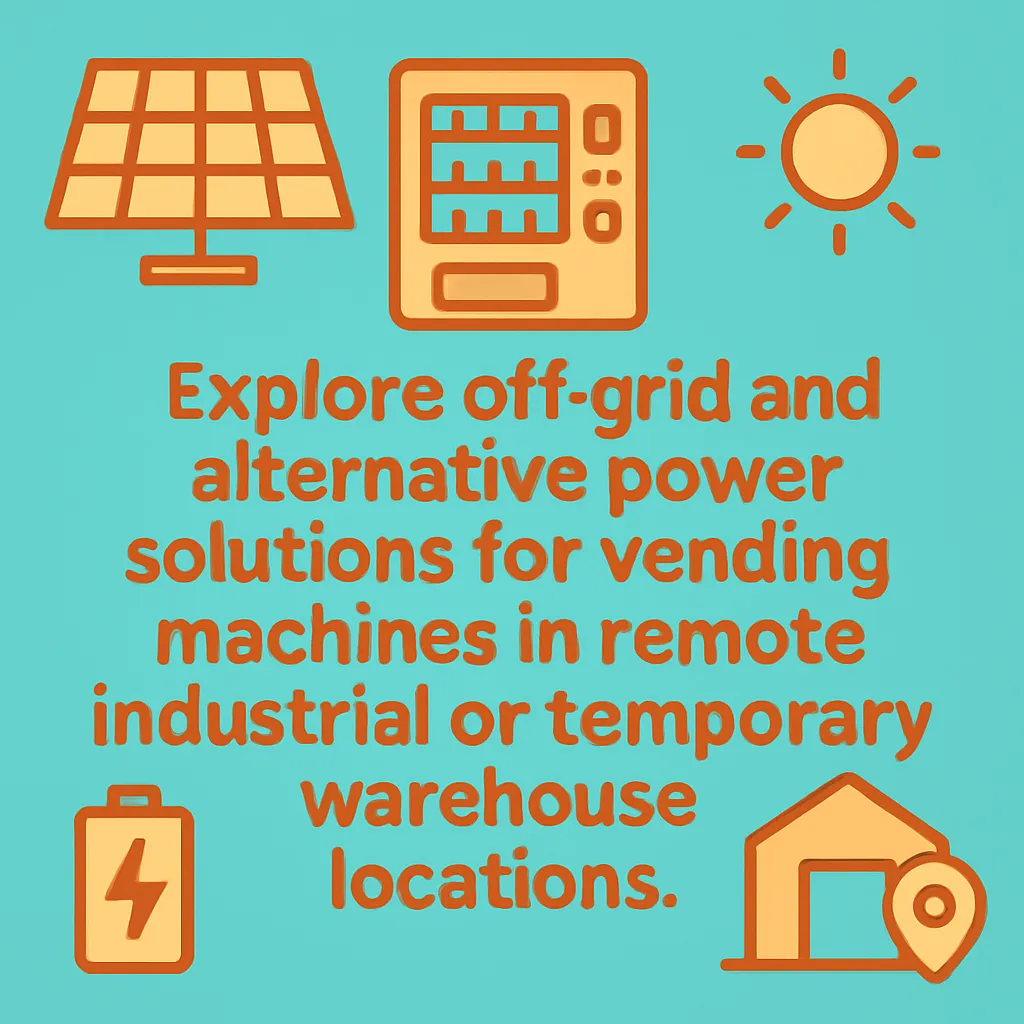Powering Vending Machines in Remote Industrial Sites
Explore off-grid and alternative power solutions for vending machines in remote industrial or temporary warehouse locations. Ensure uninterrupted service.
Back to Vending for Warehouses ResourcesExplore off-grid and alternative power solutions for vending machines in remote industrial or temporary warehouse locations. Ensure uninterrupted service.
Back to Vending for Warehouses ResourcesProviding continuous, dependable power to vending machines in off-grid industrial sites ensures ongoing service, product freshness, and worker convenience, no matter how isolated the location.
![]() Robust solutions for off-grid power access
Robust solutions for off-grid power access
![]() Ensures uninterrupted service in harsh conditions
Ensures uninterrupted service in harsh conditions
![]() Maintains product integrity and freshness 24/7
Maintains product integrity and freshness 24/7

In remote industrial sites and temporary warehouse locations, maintaining essential services for workers can be a significant logistical challenge. One often overlooked but crucial amenity is dependable access to snacks and beverages through vending machines. However, these locations frequently lack direct access to the main power grid, making traditional vending machine operation impossible. This necessitates the implementation of specialized off-grid and alternative power solutions to ensure continuous service and product integrity.
Vending machines, especially those offering refrigerated drinks and fresh food items, require a consistent power supply. In the harsh and isolated environments of industrial sites, power interruptions can lead to product spoilage, machine downtime, and worker dissatisfaction. Solutions must be robust, reliable, and capable of withstanding extreme weather conditions, from scorching heat to freezing temperatures. This often means considering more than just a plug-and-play setup.
One of the most sustainable and increasingly popular solutions for remote vending machine power is solar energy. A well-designed solar power system for a vending machine integrates photovoltaic panels to capture sunlight, an inverter to convert DC power to AC, and a battery bank for energy storage. The batteries are crucial as they store power generated during the day, allowing the vending machine to operate through the night or during cloudy periods. Modern solar-powered vending machines offer efficient operation. For further insight into the power needs of vending equipment, explore what connectivity and electrical requirements are needed.
While solar power offers environmental benefits, it sometimes needs to be supplemented, particularly in areas with limited sunlight or for machines with high power demands. This is where hybrid power solutions come into play. Combining solar panels with a backup generator (diesel, propane, or natural gas) provides redundancy and ensures continuous operation. The generator can automatically kick in when battery levels are low or when solar generation is insufficient, offering an excellent solution for critical operations or locations where uptime is paramount. Choosing the right machinery for these environments is equally important; check out best vending machines for industrial facilities to ensure durability.
By carefully selecting and implementing robust power solutions, businesses can ensure their workers in remote industrial and temporary warehouse sites have consistent access to refreshments, boosting morale and productivity, even in the most challenging locations.
The main challenges include lack of grid access, extreme environmental conditions, and the need for continuous, reliable power to maintain product integrity.
Solar power systems with battery storage, generator sets (diesel, propane), and hybrid solutions combining these technologies are commonly used.
Solar panels convert sunlight into electricity, which is then stored in batteries to power the vending machine, even during periods without sun.
Yes, ruggedized or heavy-duty machines often have reinforced casings, improved insulation, and sometimes specialize in dispensing PPE or industrial supplies.
Consider the machine's power consumption, local climate (sunlight availability), maintenance accessibility, and budget.
Oversized battery banks, redundant power sources (e.g., solar with a backup generator), and energy-efficient machines are crucial for reliable refrigeration.
Batteries store excess energy generated by solar panels or generators, providing continuous power overnight or when primary sources are unavailable.
Yes, industrial sites may have noise regulations or preferences. Quieter inverter generators or sound-dampened enclosures can mitigate noise issues.
High temperatures can increase cooling demands, while snow or dust can reduce solar panel efficiency. Robust, weather-resistant systems are necessary.
Yes, many modern systems include telemetry and remote monitoring capabilities to track power levels, consumption, and performance, sending alerts for low power.